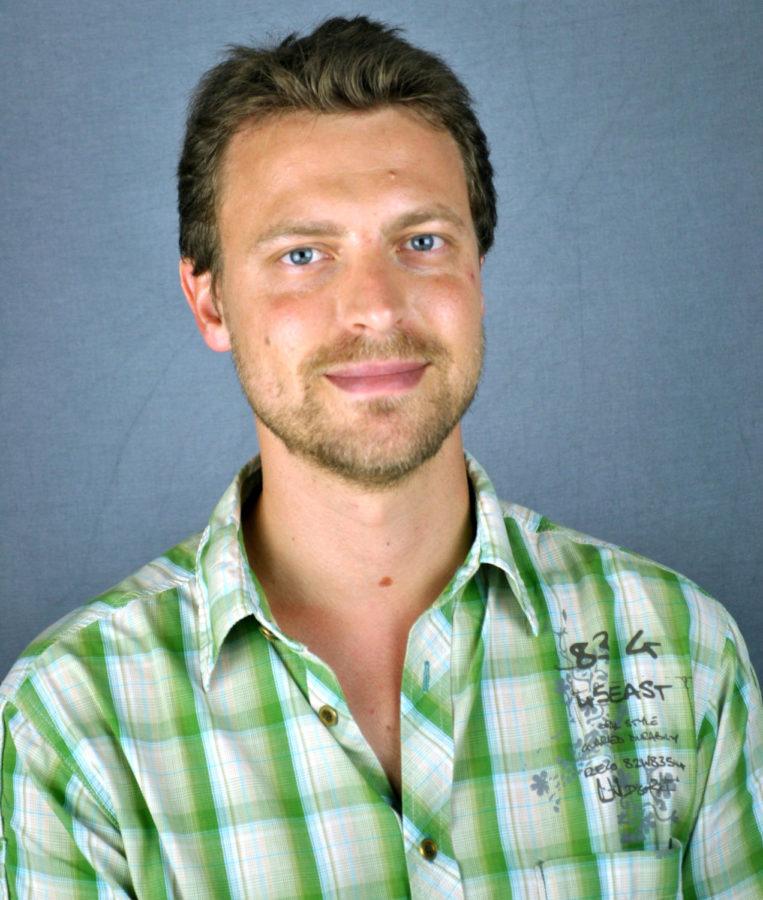Workshop to teach professors how to mix math, science with English literature
Photo courtesy of Kris De Brabanter
Kris De Brabanter
October 9, 2013
Matthew Jockers doesn’t perform research in the traditional manner. He uses math, computer science and biology to enhance his research on English literature.
The College of Liberal Arts and Sciences sees collaboration as the key to the future of research, and is emphasizing this idea with its Signature Research Themes workshops.
Jockers, assistant professor of English at the University of Nebraska-Lincoln, will teach ISU professors on Friday, Oct. 11, how to do research the way he does during the first of five workshops about how faculty can collaborate.
“When we think of a data-rich environment, we don’t really think of the English department, but the English department is a very data rich environment,” Jockers said. “We are interested in books, and there are lots of them. No one in literature has given much thought of studying thousands of books at once.”
Jockers combines statistics, computer science and biology to get insight about English literature. He uses algorithms during his collection of data.
The math models are designed to identify word patterns and themes in the written texts. Jockers said he is interested in knowing how many times authors use words such as “the” in their writing.
He adapts biological analogies to describe his work. For example, not every human genome is alike, but it develops an overall profile. Like genes, not every one person writes the same. Looking at a person’s word frequency of “the” contributes to developing his or her own profile. Analyzing word patterns and themes helps authorship attribution and development of a linguistic fingerprint.
That is the type of collaboration research LAS is looking for.
Philip Dixon, university professor of statistics and chairman of the workshop committee said: “Dean [Beate] Schmittmann and the College of Liberal Arts and Sciences, has organized and developed this idea of signature themes that focus on major areas of activity for the university, and for each of those, over the next five semesters, there will be a workshop that’s to help faculty explore what this means.”
The goal is to learn about new opportunities, topics and figure out what faculty members can do to help participate in the topic.
The five signature themes are biological structures and systems, complex materials, data-rich environments, economic environmental and societal sustainability and global citizens, education and technology.
“These five themes were selected because they represent areas of important strength in the college and they involve multiple departments’ participation,” Dixon said.
Martin Spalding, associate dean for LAS, said: “Themes grow around centers of excellence around the college. These themes also cross the breadth of the Liberal Arts and Sciences College.”
The college wants to hire faculty for the needs within the framework of the research themes. The needs are to provide excellent teaching, broad responsive curricular and building strength in research themes.
“If the whole idea of the signature themes works, this is going to change the characteristics of the faculty we have here because this helps drive hiring initiatives in the college,” Spalding said.
“It will change the sorts of courses we offer. It will change the sorts of research that the faculty do.”
The LAS website says the Signature Research Themes workshops will define the college’s scholarly vision, identity and provide a framework for faculty hiring and collaborations.
The first workshop will discuss exploring rich-data environments, and Jockers is to be the opening keynote speaker on Friday.
In addition to Jockers, the workshop will include a panel discussion, breakout sessions to consider challenges and opportunities, a social hour and Kris De Brabanter, assistant professor of computer science, as the closing keynote speaker.







